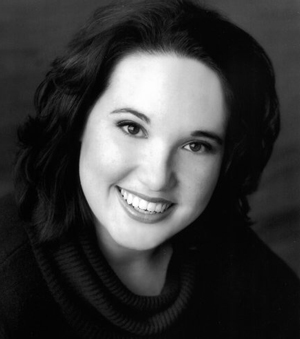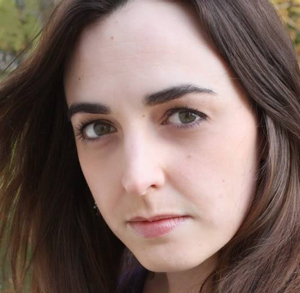by Mike Telin

Beginning on Wednesday, February 25 at 7:30 pm in the Cleveland Institute of Music’s Kulas Hall, CIM Opera Theatre will present La clemenza di Tito. The fully staged production is directed by David Bamberger, and Harry Davidson will lead the CIM orchestra. Performances run through Saturday, February 28.
This past weekend I spoke to three of the cast members, all of whom shared insightful thoughts about their complex characters. They also gave high marks to Bamberger for his directing of this “modern” production as well as crediting Davidson for his helpful musical advice.
Originally from the Twin Cities, soprano Angela Kaso (Vitellia, above) is a second year Master’s student of Dean Southern.
MT: Vitellia causes more than a few problems during the opera. Can you give me your insights into her personality?
Angela Kaso: I feel like her personality is all over the place during the opera. She’s a vengeful person in the first act. As we get into the second act, she starts to become a little remorseful because she has caused so much trouble — Sesto is going to be executed because of her. She is a selfish person, and at the end she feels bad for what she has done, but she’s really just feeling sorry for herself because she’s not going to be married.
MT: Do you think she cares about Sesto, or is she just out for herself?
AK: Honestly, I think she’s just out for herself. In the beginning she is so upset with Tito, she has a one track mind and doesn’t care who gets in her path of vengeance. Even in the second act I think she feels bad about what she has done. But no, I don’t think she actually cares for Sesto at all. He’s like a toy for her. She knows that he is infatuated with her and she uses that to her advantage.
MT: What musical challenges does the role present?
AK: The vocal range is very demanding. It’s over two octaves — from a low G to a high D. There are not many soprano roles that go that low, but I’m having fun dipping down into that low range. Her first-act aria is very playful — she’s being very manipulative at that point. I’ve really connected to the famous second-act aria. It’s one I can really dig into.
MT: You’ve returned to CIM after taking some time off?
AK: Yes, from 2002-2004 I was in the Professional Studies program, and I was a member of the Cleveland Opera and Opera Cleveland choruses for two seasons. I now have two children who are two and six. And after teaching, something sparked a little fire in me, and now I’m back doing what I love.
As I’ve gotten older I feel like those low notes we were talking about have gotten more mature. I’ve always had a pretty good range, but now it’s nice to see that I am getting those notes. It’s been a fun discovery for me.
A native of San Luis Obispo, CA, mezzo-soprano Elizabeth Frey (Sesto) is in her final year as a Professional Studies student of Mary Schiller.
MT: You are taking on another trouser role?
Elizabeth Frey: Yes I am, and it’s very challenging to play an adult man. When I played Hansel, I could put on these masks of a child. But playing an adult man is much more subtle, especially when it’s a main character. I don’t have to be totally believable as a man, but I need to convey that idea so the audience doesn’t become too distracted. But I am enjoying that challenge.
Also, the other adult males that I’ve played have all been from the 18th century, so I was able to put on those characteristics. But this production is a modern setting, so I’m playing a modern adult male, which makes it even more challenging.
MT: Sesto, he’s quite complicated. Can you give me your impressions of him?
EF: I am a little biased, but I do think he is the most complex character in the opera. He’s extremely human, and you want to feel for him. I also think he’s easily influenced by those around him, but he is also tormented by that. He’s obsessed with Vitellia, and I think he is surprised by how far his obsession has gone — to the point that he could be capable of killing someone. The interesting part is that he knows he’s making the wrong decision. He’s tormented by it but he cannot stop either.
MT: But he’s obsessed with a crazy manipulator. What does he see in her?
EF: He is. If there’s a villain in the opera, I think it is Vitellia. I don’t think he even knows why he’s so obsessed with her. He obviously has a lust for her. I don’t think he’s ever experienced such strong feelings for a woman before, and I think he is overwhelmed by those feelings. He keeps saying over and over that he does not want to kill Tito, his best friend, but he agrees to do it anyway. And that’s why it’s an interesting role — he’s a hard nut to crack. I’m having a lot of fun with the character.
MT: You also get to sing one of the opera’s most famous arias.
EF: Yes, Parto, parto, ma tu, ben mio, with that great clarinet obbligato. It’s going to be so much fun to sing with the orchestra. I have to say that playing Sesto is a dream role. I’ve been working on the music for a long time. And as a mezzo, it’s enjoyable to be in a Mozart opera and to be able to sing those big dramatic solos.
Hailing from Birmingham, Alabama, tenor Brian Skoog (Tito) is a Professional Studies student of Vinson Cole.
Mike Telin: Who is Tito and what are his motivations?
Brian Skoog: I remember seeing the opera a few years ago, and my impression of Tito was that he is a saintly figure who is nice to everybody and forgives everybody in the end.
I’ve had to find the human side to him, and the music has been a big help with that. There are some accompanied recitatives where you can hear his inner conflict, and there are several points where his feelings of betrayal almost get the best of him. My goal has been to bring out this inner conflict and maybe even build some suspense, despite the spoiler of the opera’s title— you know he’s going to forgive everyone in the end.
MT: Do you think he knows what Vitellia is up to?
BS: No, I think it’s all going on behind his back. In fact, the first time the two are onstage together is during the finale of the opera. Tito believes the best in people, and he doesn’t think this could happen. Clearly Sesto is his closest friend and advisor — that’s why everything hurts so much. It’s difficult to show their friendship because the opera has no duet for Tito and Sesto, and no long recitatives until after the betrayal. You almost have to shine the light backwards to show the personal friendship they had before.
MT: Are you having fun with the role?
BS: I’m having a lot of fun with it. The arias speak for themselves, but the accompanied recitatives are my favorite because they are almost like a puzzle. You get clues from the orchestra, but the key to Tito’s character is those moments when he’s having conversations with himself. I think it’s fascinating that Mozart left us this code to the character.
MT: What are the vocal challenges?
BS: The accompanied recitatives are a challenge. But dramatically, the final aria is difficult because it’s verging on being a mad scene. Endurance is also an issue — I think in act two I’m on stage most of the time. But I have grown as a singer. It’s pushed my personal limits as an actor — showing Tito as both grand and human. And portraying him musically, as well. I want to sound kingly.
Published on ClevelandClassical.com February 17, 2015.
Click here for a printable copy of this article





